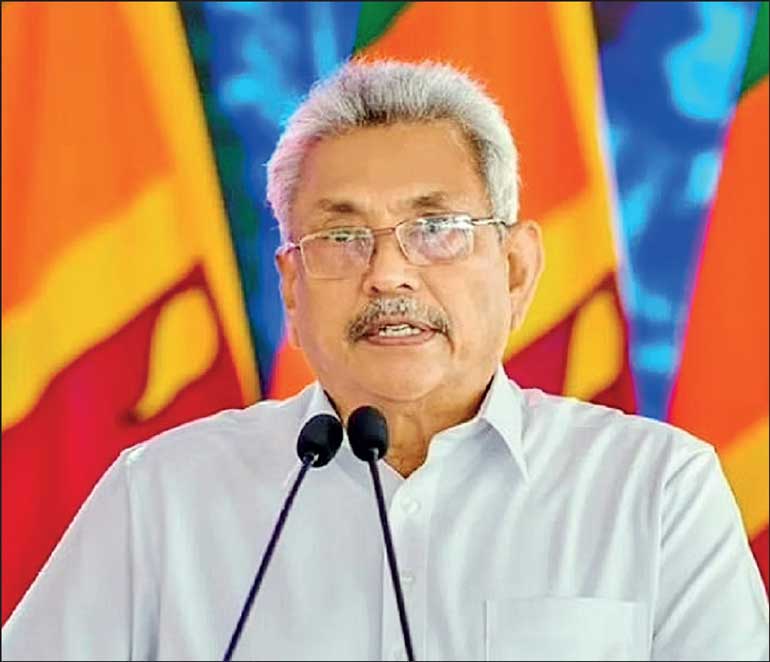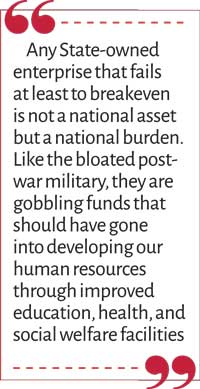Tuesday Feb 17, 2026
Tuesday Feb 17, 2026
Wednesday, 6 July 2022 00:30 - - {{hitsCtrl.values.hits}}

President Gotabaya Rajapaksa
“The dismal silence of places without intelligence” – Camus
(Lyrical and Critical Essays)
by Tisaranee Gunasekara
World War I began with fanfare. Leaders of all combatant nations predicted that their victorious troops will be home for Christmas. People believed and cheered. Only a few understood that the war would ruin losers and winners. “The lamps are going out all over Europe. We shall not see them lit again in our lifetime,” British Foreign Secretary Sir Edward Grey lamented.
In Sri Lanka, most of the lamps are already cold, snuffed out by the economic idiocy of the Rajapaksas. Only a few cling to a flickering life. They too might go out soon, as the remaining air is sucked in by a president determined to cling to power at whatever cost and a suffering people bereft of rational leaders or sane choices.
There was always more than an echo of Narcissus in Gotabaya Rajapaksa, a man enamoured of his own performance. As Sri Lanka unravels strand by strand and Lankans swing from fury to despair and back, Gotabaya Rajapaksa’s conviction of his own infallibility remains rock-solid. He is the unmoving mover of his own story. Sanguine in his cluelessness he issues gazettes, writes letters to world leaders, instructs officials, and scatters promises. His robe of leader-extraordinaire is in tatters. Every citizen might yell about the emperor’s unclothed state, but the emperor doesn’t hear, can never hear. 
The revitalised Aragalaya has given the president time till 9 July to go home. He won’t. Had Sri Lanka remained a parliamentary democracy, a no-confidence motion would have sufficed. Thanks to the presidential system, J.R. Jayewardene’s deadliest legacy, there’s no constitutional lever to quickly dislodge even the most unsound president.
A comprehensive 21st Amendment could have defanged the presidency rendering Gotabaya Rajapaksa relatively harmless. That opportunity was lost because neither PM Wickremesinghe nor the Opposition could transcend the rut of narrow self-interest. The SJB and the JVP seem incapable of agreeing on anything beyond sending Gota and Ranil home. Whatever happens, or doesn’t happen on 9 July, the political gridlock will continue.
Gotabaya Rajapaksa, his brothers, nephews, and cousins are the main authors of the Lankan tragedy. But even if a kind wind blows the entire Rajapaksa clan to another plain of existence, the economic crisis will remain as intractable as ever, until the bitter pills of cost-cutting and revenue-raising are swallowed. That would mean roiling powerful vested interests, ranging from the military and the oligarchs to state-sector trade unions and monks.
The Rajapaksas lied to the people mostly out of ignorance. The Opposition is failing to tell the truth out of cowardice and opportunism. Maybe that is why the SJB and the JVP limit their economic pronouncements to promises and slogans. Meanwhile, the Gota-go-gama protestors are to unveil their policy program on Tuesday. Its contents will indicate whether they are the solution they claim to be or just another slice of the problem.
Imposing a starvation diet on holy cows
The image of a uniformed Lt-colonel (backed by several uniformed underlings) kicking an unarmed and unresisting civilian in a Kurunegala police station has sent shockwaves across the country. It shouldn’t have. This is what a military becomes when politicians and people put it on a pedestal beyond law and norms. (Incidentally, that officer’s conduct would have elicited only a shrug in the north and parts of the east.)
The Rajapaksas brought the military into politics to bolster familial rule. They birthed a war-hero narrative turning the uniform into an object of veneration (like the saffron robe) and its wearer an inerrant man. This mythical image was eagerly embraced by the south. Almost seven million Lankans – nearly all of them Sinhalese – voted for Gotabaya Rajapaksa in 2019 partly because they regarded him as the epitome of war-hero, the authentic representative of the men in uniform. In him they saw a leader willing to remake Lankan society in the military’s image, a disciplined mass incapable of critical thinking or independent action.
Even in early 2022, as Rajapaksa popularity plummeted, most Sinhalese supported the militarisation of civil spaces. More than one-third even liked the idea of military rule!
Thanks to Rajapaksa power games, a kind of a caste consciousness has developed within the military, a dangerous sense of independence. Sri Lanka’s defence costs have continued to balloon, even after the war. If a post-Rajapaksa government is to reduce state expenditure without gutting education, health, and social welfare, it will have to prune the bloated defence budget. The military is likely to stonewall any cost-cutting; crying treachery would be the next step with a segment of the populace and monks serving as mouthpieces.
Military is one of the many sacred cows that will have to be put on a starvation diet if Sri Lanka is to escape the current economic morass without beggaring her people still further. Another holy bovine in need of trimming is loss-making State enterprises. 
The recent COPE probe into the CEB provides some clues about how State-owned enterprises operate. For instance, until 2020, we, the people, seem to have paid the PAYE and personal income taxes of CEB’s officer cohort, to the tune of Rs. 4.8 billion. In another surreal, meter readers are paid one allowance for reading meters, and another allowance for reading meters correctly! Contrary to the received wisdom, the CEB is not subsidising the people; the people are subsidising the CEB. How are these parasitic officials any better than the politicians we love to deride?
Any State-owned enterprise that fails at least to breakeven is not a national asset but a national burden. Like the bloated post-war military, they are gobbling funds that should have gone into developing our human resources through improved education, health, and social welfare facilities.
Politicians of all stripes and types are unwilling to touch these cash-guzzling sacred bovines not out of national interest but out of self-interest. These enterprises are the economic fief of our political class, the mainstay of the patron-client networks that have turned Lankan politics into a mire of corruption. Without these entities, how can politicians provide cushy jobs to their kith, kin, and supporters and win commissions and kickbacks? Without these entities, how can politicians build their mini-empires?
If Sri Lanka is to do a deal with the IMF (without which there can be neither debt-restructuring nor further borrowing), some of these enterprises will have to be privatised partly or wholly. Such privatisation will not work if done via insider deals as happened in the former Soviet Union. That will only serve to strengthen Sri Lanka’s own oligarchs while bringing no benefits to the country or the people. The model to follow is Mangala Samaraweera’s successful telecommunication privatisation. In a 2016 speech, Samaraweera identified the three steps of that process.
The first was bringing in competition. “Competition not only directly benefited consumers by cutting prices, improving quality and increasing choice; this competition helped reform SLT and enabled Sri Lanka’s telecommunications boom.” The second was trifurcating operations, policymaking and regulations. “We handed over management control to NTT, a Japanese telecoms firm, and in the second stage of reforms reduced the Government’s stake to below 50%. We also created an independent Telecommunications Regulatory Commission to regulate the industry...”
The third was building a support base. “We bypassed union bosses and spoke directly to workers. We found the home addresses of the 8,500+ SLT workers and sent letters explaining the benefits of reform, including an employee share ownership scheme that accounted for 3.5% of total shares, to workers’ wives and families... We also helped union leaders and workers understand the benefits of our reforms by sending them on fact-finding tours abroad” (https://www.ft.lk/article/559278/Mangala-time-travels-to-share-SLT-privatisation-experience).
According to the most recent consumer survey, 91% of Lankans owned some kind of telephone, proof of how privatisation, done right, can work for ordinary people.
Another sacred bovine that must be tamed is taxation. The current crisis was born with the massive tax cuts of November 2019, a presidential giveaway to oligarchic and professional acolytes. Some of the tax cuts have been reversed but more needs to be done. Will a post-Rajapaksa government have the political will to further increase personal and corporate income taxes and introduce a wealth tax targeting our own 1%? Or will they too be in thrall to their financial backers, opting to print money and hike indirect taxes?
Political change is necessary. But to heal the economy and save ordinary people, economic reforms are essential. If pressure from powerful vested interests retards reforms, the price will be paid by ordinary Lankans with their health, education, and even lives.
 Rethinking the People
Rethinking the People
In September 2019, just two months before the presidential election, retired general Kamal Gunaratne’s book on Gotabaya Rajapaksa was launched. People thronged the Vijitha Yapa stall to buy the hagiography and get it autographed by its subject. As a young fisheries-businessman said, most of the buyers were young people clamouring for Change. These first and second time voters played a key role in Gotabaya Rajapaksa’s election campaign and his spectacular victory. They were the ones who, in the immediate aftermath of election victory, couldn’t pass a wall without running for a paint tin and a brush.
Today, they are disenchanted and angry. In the fuel queues and at demonstrations, mea culpas abound. Still the question needs to be asked and answered – why were so many people deceived so easily?
The short answer is Sinhala-Buddhist supremacism. The change they wanted began with Sri Lanka where minorities knew their place and stayed in it. It was this deeply ingrained racism which enabled the likes of Wimal Weerawansa to scream about a War on Wombs, accusing Dr. Shafi Sahabdeen, without an iota of factual proof, of secretly sterilising thousands of Sinhala-Buddhist mothers. Those insane and lurid fantasies sounded credible to millions of Sinhalese – especially youth – because they accorded with their own deeply held fears and prejudices.
Remember Hejaaz Hizbullah, the lawyer and human rights activist, who was arrested under the PTA and held without charges for almost two years? In September 2020, the CID informed the Fort magistrate that Hizbullah’s welfare organisation Save the Pearl had received Rs. 13 million from Qatar Charity. According to its investigations, Qatar Charity was a terrorist organisation, the CID stated.
A simple web search could have unearthed the truth. But phobia not facts was the flavour of the times. The charity was banned and its funds in Sri Lanka frozen.
Now ministers are going to Qatar Charity for alms. The terrorist ban has been lifted and assets unfrozen. Not a word has been said though about how Qatar Charity cased being a terrorism organisation literally overnight. All those who howled Terrorist at Qatar Charity and Hejaaz Hizbullah are silent, as if struck by collective amnesia.
This is Rajapaksa politics at work. Country, race, religion, patriotism, terrorism, all are but means to an end, that of Rajapaksa power.
The conduct of most of the monks (with a few venerable exceptions) was no different. They turned a vote for Rajapaksas into a sacred deed, a religious duty. (The Asgiriya chapter was probably the worst of a bad lot, with its prelates giving tacit consent to the stoning of Muslims and advising Gotabaya Rajapaksa to be like Hitler.) If the monks had cleaved to religion, instead of dabbling in everything else from politics to sex education, this country would be in a better place now. The return of this ignorant and myopic political-Buddhism to Gota-go-gama is indicative of our congenital inability to avoid past mistakes.
The Rajapaksas have not given up their dreams of power. They will build their dynasty even on a land awash with blood. Basil Rajapaksa is reportedly gathering troops for LG polls scheduled for 2023. Even as the country reels from a crime wave, the CID is busy chasing journalists and activists. Journalist Tharindu Uduwaragedara was summoned to the CID last week over a complaint made by Air Force intelligence in September last year.
Blinded by greed and hubris, the Rajapaksas fail to see the lengthening shadow of Nemesis, the Greek goddess of retribution. Her dark shade falls on us too, as we spend days in fuel queues or try to make ends meet with a rupee which is losing its value faster than the Rajapaksas are losing adherents.
We needed myths and embraced lies. Confronted with the emptiness of our most cherished beliefs, we are destitute. In our desperation, we must not chase different, but equally lethal, mirages. Getting rid of a democratically elected president with the active participation of the military is the stupidest kind of Faustian bargain. It is one thing to ask the military to stay out of this political contest. It is quite another thing to ask the military to turn their gun on the ‘common oppressor’, even if such solicitations are nothing more than catchy slogans.
In Egypt’s Tahrir Square, the military sided with the protestors to oust a dictator. We know how that story ended. Perhaps there’s no crime Nemesis abhors more than the avoidable stupidity of the wilfully ignorant.